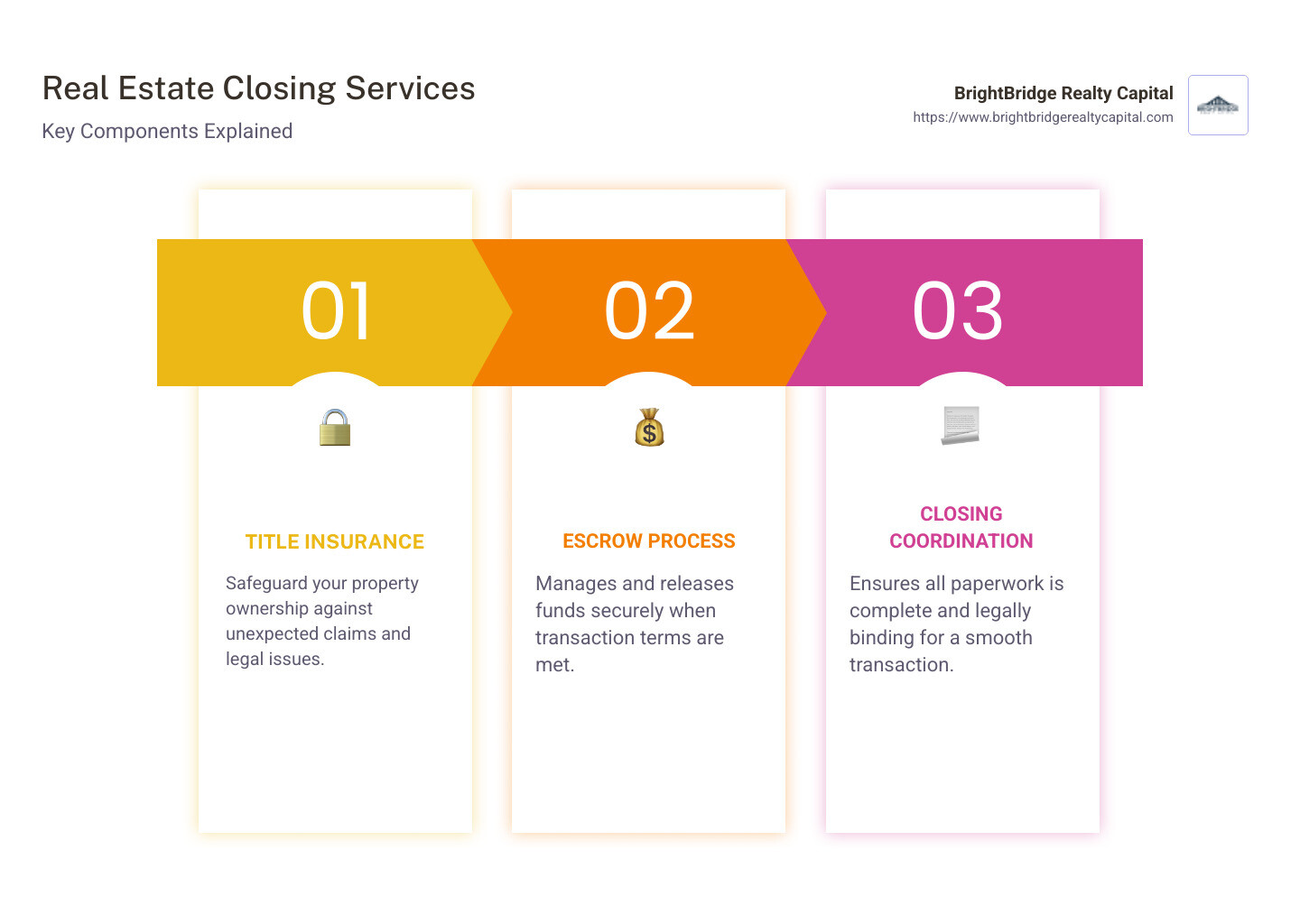Closing Time: Mastering Real Estate Closing Services

Real estate closing services are essential for a smooth property transaction. Whether you're an experienced investor or a first-time homebuyer, understanding these services is crucial. Here's a quick overview:
- Title Insurance: Protects your property ownership against unexpected claims and legal issues.
- Escrow Process: A secure way to manage and release funds only when transaction terms are met.
- Closing Coordination: Ensures all paperwork is complete and legally binding.
In real estate, mastering closing services can mean the difference between a smooth transaction and a stressful experience. At BrightBridge Realty Capital, we make the process seamless, helping you focus on what matters most—capitalizing on your investments efficiently.

Explore more about real estate closing services:
Understanding Real Estate Closing Services
When buying or selling a property, navigating real estate closing services is essential. These services are the final step in the transaction process, where all the details come together to officially transfer ownership. Let's break down some key components:
Closing Costs
Closing costs can catch many buyers and sellers by surprise. They include various fees related to the transaction, such as:
- Mortgage fees: Charges from the lender for processing the loan.
- Real estate commissions: Payments to real estate agents for their services.
- Title insurance: Protects against potential claims on the property.
These costs can add up quickly, so it's wise to shop around for competitive prices. Don't just go with the first offer you receive; explore your options to save money.
Settlement Agent
A settlement agent plays a crucial role in closing. Think of them as the orchestrator of the entire process. They ensure that:
- Funds are properly disbursed: Making sure everyone gets paid what they are owed.
- Documents are signed and recorded: Ensuring all paperwork is complete and legally binding.
Settlement agents can be real estate attorneys, escrow officers, or representatives from a title company. Their job is to make sure everything runs smoothly, so choosing a reliable one is key.

Escrow Account
An escrow account is like a safety deposit box for your transaction. Here's how it works:
- Funds are held securely: Money is kept safe until all terms of the sale are met.
- Protects both parties: Ensures that the buyer receives the property and the seller gets paid.
Think of it as a neutral third party that holds onto the money until everyone agrees that the deal is ready to close. It's a crucial part of ensuring trust and security in the transaction.
In the field of real estate, understanding these components of closing services can save you time, money, and stress. BrightBridge Realty Capital is here to guide you through every step, ensuring a seamless and efficient closing process.
Next, we'll explore the role of title insurance in closing.
The Role of Title Insurance in Closing
When you're buying a home, title insurance is your safety net. It ensures that the property you're purchasing is truly yours, free from any hidden surprises that could cause headaches down the road.
What is Title Insurance?
Title insurance protects you and your lender from unexpected claims against your new property. It's like a shield, guarding against potential legal challenges. These might include:
- Unpaid taxes: Previous owners may have left tax bills unpaid.
- Fraudulent claims: Someone might falsely claim ownership of your property.
- Mistakes in public records: Errors in paperwork can lead to disputes over who owns the property.
Why is it Important?
Imagine finding out that someone else has a legal claim to your property. Not fun, right? Title insurance helps prevent these situations by covering legal fees and any losses if a claim arises.
Here's a quick breakdown of what title insurance does:
- Protects your ownership rights: Ensures you have clear and undisputed ownership.
- Covers legal costs: If a claim arises, your insurance can cover attorney fees.
- One-time purchase: Unlike other insurances, you pay for title insurance once, at closing.

Real-Life Impact
Consider this: A buyer in New York purchased a home, only to find an old lien on the property. Without title insurance, they would have been responsible for resolving this costly issue. Instead, their insurance covered the legal battle, saving them thousands.
The Peace of Mind Factor
Having title insurance means you can sleep easy, knowing your investment is protected. It’s a small cost for significant peace of mind.
In the next section, we'll dig into the escrow process, another critical component of real estate transactions.
Navigating the Escrow Process
When buying a home, navigating the escrow process is crucial. It's the bridge between making an offer and officially owning your new property. Let's break down the essentials:
Escrow Requirements
Escrow is like a safety deposit box. It holds funds and documents until all conditions of the real estate agreement are met. Here’s how it works:
Open an Escrow Account: After agreeing on a purchase price, your earnest money goes into this account. It’s managed by a neutral third party, ensuring neither buyer nor seller can access the funds prematurely.
Meet All Conditions: Before closing, you must satisfy all conditions outlined in the purchase agreement. This might include completing inspections or repairs.
Secure Financing: Have your financing ready. Your lender will need to approve the mortgage, ensuring you can pay for the home.
Secure Financing
Before reaching the closing table, securing financing is a must. Here’s what you need to know:
Pre-Approval: Ideally, you should have a pre-approval letter from your lender. This shows sellers you're serious and financially capable.
Loan Commitment: Once you’ve got the property address, your lender will finalize your loan details. This includes interest rates, closing costs, and monthly payments.
Remove Contingencies: If your offer had a financing contingency, remove it in writing once your mortgage is secure.
Bank Approval
Your lender will conduct an appraisal to ensure the home’s value aligns with the loan amount. Here’s the step-by-step:
Appraisal: The bank sends an appraiser to evaluate the home’s worth. This protects the bank, ensuring they aren't lending more than the property is worth.
Approval or Adjustments: If the appraisal meets or exceeds the sale price, great! If not, you may need to renegotiate the price or pay the difference.
Final Approval: Once all is satisfactory, the bank gives final approval, moving you closer to closing.
The Escrow Timeline
The escrow process can vary, but it typically lasts 30-60 days. Here’s a simplified timeline:
- Day 1-10: Open escrow and deposit earnest money.
- Day 10-20: Conduct inspections and appraisals.
- Day 20-30: Finalize financing and remove contingencies.
- Day 30-60: Close escrow and receive keys!
Navigating escrow can seem daunting, but with the right preparation, it’s a smooth ride to homeownership. Next, we'll explore flexible closing options that fit your busy life.
Flexible Closing Options
In today's world, real estate closing services need to adapt to fit your busy schedule. That's why flexible closing options are more important than ever. Let's explore how you can close on your new home without missing a beat.
Remote Notarization
Remote notarization is a game-changer. It allows you to sign important documents online, without needing to be physically present. This is perfect if you're out of town or simply prefer the convenience of digital transactions. However, it's important to note that remote notarization isn't available for all transaction types and locations. Always check with your closing office to see if this option is available for you.
Mobile Notary
If you prefer a more personal touch but still need flexibility, a mobile notary is a great choice. A certified notary comes to you, whether that's your home, office, or even a local coffee shop. This service offers the convenience of in-person notarization without the hassle of traveling to a title office.
Closing Agent
A closing agent plays a crucial role in ensuring your transaction goes smoothly. They coordinate the entire closing process, making sure all documents are in order and that both parties are informed every step of the way. Whether you're closing in person or remotely, having a knowledgeable closing agent can make all the difference.
By choosing the right option for your needs, you can ensure a seamless and stress-free closing experience. Up next, we'll discuss how to protect your investment from wire fraud and other security threats.
Protecting Your Investment: Wire Fraud and Security
When it comes to real estate closing services, protecting your investment is as crucial as finding the perfect home. One major threat to watch out for is wire fraud, a growing concern in real estate transactions.
Wire Fraud Protection
Wire fraud occurs when criminals trick you into sending money to the wrong account. This can happen through fake emails or phone calls that seem legitimate. Imagine you’re about to close on your dream home, and suddenly, your funds vanish. It's a nightmare scenario, but one you can avoid with the right precautions.
CertifID: Your Security Partner
To combat this threat, BrightBridge Realty Capital partners with CertifID. This service adds an extra layer of protection by verifying identities and ensuring that your funds reach the right place. CertifID guarantees transactions up to $1 million, offering peace of mind during your closing process.
CertifID’s state-of-the-art verification procedures make sure that every transaction is secure from start to finish.
Enhancing Transaction Security
Here are a few steps you can take to improve your transaction security:
Verify Instructions: Always double-check wiring instructions with your closing agent. Use a known phone number to confirm any details.
Stay Alert: Be wary of last-minute changes to wiring instructions. Scammers often use urgency to push you into making mistakes.
Use Secure Channels: Communicate through secure and verified channels when discussing sensitive information.
By staying vigilant and using services like CertifID, you can protect your real estate investment from wire fraud and ensure a safe closing process. Ready to dive deeper into the closing process? Let's tackle some frequently asked questions about closing costs and more.
Frequently Asked Questions about Real Estate Closing Services
What are typical closing costs?
When buying a home, closing costs can sneak up on you. They usually make up 2% to 5% of the purchase price. These costs include various fees like mortgage fees, real estate commissions, and more.
Mortgage fees cover application, origination, and underwriting costs. Meanwhile, real estate commissions are usually paid by the seller, but they can impact the overall price.
Other common costs include:
Title insurance: Protects against ownership disputes.
Escrow fees: Paid to the company managing the escrow account.
Recording fees: Charged by local governments to record the sale.
Knowing these costs helps you plan your budget better.
How can I save money on closing services?
Saving money on real estate closing services is possible with a little shopping around. Here’s how:
Shop for Services: Don’t just go with the first option. Compare prices for services like title insurance and escrow.
Competitive Prices: Ask for quotes from multiple providers. You might find a better deal elsewhere.
Lender Recommendations: Be cautious with lender-recommended providers. They might not always offer the best rates.
By doing your homework, you can find quality services at competitive prices.
Do I need a real estate attorney for closing?
Whether you need a real estate attorney depends on your state. Some states require an attorney to prepare and review legal documents.
Even if not required, hiring an attorney can be beneficial. They help ensure all documents are in order and can offer flat fee services for added transparency.
An attorney can also guide you through any legal jargon, making the closing process smoother. If you're unsure, it’s always a good idea to consult with one to protect your interests.
Having tackled these questions, you're now equipped with the knowledge to steer closing costs and services. Next, we'll explore flexible closing options that can make your home-buying journey even easier.
Conclusion
At BrightBridge Realty Capital, we understand that time is of the essence in real estate investments. That's why we specialize in providing quick funding solutions that help you seize opportunities as they arise. Our commitment to a seamless process ensures that you can move forward with confidence, knowing that your financing needs are in capable hands.
Our real estate closing services stand out for their speed and efficiency. We often close deals within a week, thanks to our direct lending approach that cuts out intermediaries. This not only speeds up the process but also allows us to offer competitive rates that are hard to beat.
Whether you're a seasoned investor or a newcomer to the real estate market, our team is dedicated to supporting your investment goals. We offer a range of flexible funding options custom to your specific needs, ensuring that your projects stay on track.
If you're ready to experience the benefits of quick and seamless real estate financing, visit our website to learn more about how BrightBridge Realty Capital can assist you in achieving your investment objectives.
With us, you're not just getting funding—you're gaining a partner committed to your success.


